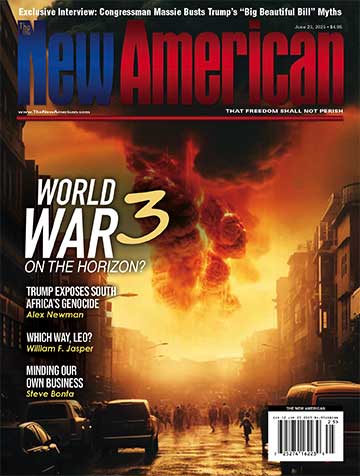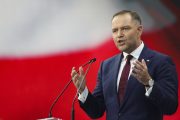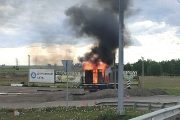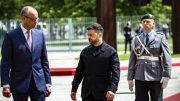
SINGAPORE — Argentine and Chilean leaders lowered the odds that they may offer more backing for Ukraine during German Chancellor Olaf Scholz’s inaugural South America tour, reflecting existing differences between the West and its South American allies.
On the first two legs of his trip, Scholz highlighted the importance of unity, noting that all three countries he was poised to visit — Argentina, Chile, and Brazil — decried Russian actions in Ukraine at the United Nations (UN) General Assembly last year.
Nonetheless, the effects of the war and Western sanctions on Russia, such as rising food and energy prices, have sent economies in South America into freefall, heightening doubts about the West’s approach toward the Ukraine issue.
Skepticism towards interventionism also looms in South America due to its historical legacy.
Scholz’s Argentine and Chilean counterparts said they hoped to see a peaceful resolution of the conflict, but did not indicate more support for Ukraine.
“Argentina and Latin America are not planning to send weapons to Ukraine or any other conflict zone,” Argentine President Alberto Fernandez said during a joint news conference in Buenos Aires with Scholz on Saturday.
Chilean President Gabriel Boric justified his criticism of Russian actions notwithstanding the fact that “some media or opinion makers could believe it was a bad decision to get involved in the politics of other countries.”
Sidetracking a question about whether he was on the same page with Fernandez on weapons, Boric said Chile had pledged to aid Ukraine rebuild after the war with efforts such as clearing mines.
In both countries, Scholz visited memorials to the victims of their military dictatorships, which he said showcased the need to fight for democracy and freedom. “At this memorial to the many victims of the dictatorship here, I cannot help but think of the young people who are being killed … because they are fighting for freedom and a better life,” he said in Buenos Aires.
German government officials have expressed their empathy for the divergent views on the Ukraine crisis among Latin American countries. Yet these officials singled out the necessity of still communicating the Western perspective — as Scholz has also done in Africa and Asia.
In Brazil, Scholz became the first Western leader to meet socialist and ex-convict President Luiz Inácio Lula da Silva, or Lula, since the latter ascended to the presidency in January.
Following the retreat of conservative and pro-life former president Jair Bolsonaro from the Brazilian political scene, Europe has indicated its plans to reboot ties with South America’s biggest country.
Lula posited that Russia should not have invaded Ukraine, but elaborated that Ukrainian President Volodymyr Zelensky was as responsible for the war as Russian leader Vladimir Putin.
The left-leaning Scholz is not the only world leader to pressure countries to back Ukraine one year since the crisis erupted. In Asia, North Atlantic Treaty Organization (NATO) Secretary-General Jens Stoltenberg similarly urged South Korea to ramp up military support for Ukraine, illustrating how other countries have amended their policy in the wake of Russian actions in the eastern European country.
Speaking at the Chey Institute for Advanced Studies in Seoul, Stoltenberg expressed his gratitude to South Korea for its non-lethal aid to Ukraine, but pushed it to do more, elaborating that there is an “urgent need” for ammunition.
“I urge the Republic of Korea to continue and to step up on the specific issue of military support,” he said. “At the end of the day, it’s a decision for you to make, but I’ll say that several NATO allies who have had a policy to never export weapons to countries in a conflict have changed that policy now.”
In talks with senior South Korean officials, Stoltenberg argued that events in Europe and North America are intertwined with other regions, and that the alliance wants to manage global threats by stepping up partnerships in Asia.
South Korea has inked a number of key deals supplying hundreds of tanks, aircraft, and other weapons to NATO member Poland since the war began, but South Korean President Yoon Suk-yeol has asserted that his country’s law against supplying arms to countries in conflicts makes offering weapons to Ukraine challenging.
Stoltenberg contended that countries such as Germany, Sweden, and Norway had similar policies but subsequently amended them. “If we don’t want autocracy and tyranny to win, then (the Ukrainians) need weapons, that’s the reality,” he said.
The NATO chief argued it was “extremely important” that Russia lose this conflict, not only for the Ukrainians but also to caution other authoritarian leaders, such as the Chinese Communist Party (CCP) in Beijing, against trying to get what they want by force.
While China is not NATO’s adversary, it has become “much higher” on NATO’s agenda, Stoltenberg said, pointing out Beijing’s increasing military capabilities and pugilism in the region.
“We believe that we should engage with China on issues like arms control, climate change and other issues,” he said. “But at the same time, we are very clear that China poses a challenge to our values, to our interests and to our security.”
In response to Stoltenberg’s remarks, Chinese Foreign Ministry spokesperson Mao Ning said that China was a partner to countries, not a challenge, and that it did not undermine any nation’s interests or security.
“We also hope that NATO will abandon its Cold War mentality and the concept of bloc confrontation, and do more for the security and stability of Europe and the world,” Mao told a regular news briefing.
In a statement carried by state media on Monday, North Korea lambasted Stoltenberg’s visit as a “prelude to confrontation and war as it brings the dark clouds of a ‘new Cold War’ to the Asia-Pacific region.”
In 2022, South Korea unveiled its first diplomatic mission to NATO, pledging to boost collaboration on nonproliferation, cyber defense, counter-terrorism, disaster response, and other security areas.
The NATO chief’s visit came as U.S. Defense Secretary Lloyd Austin was supposed to arrive in Seoul for talks with his South Korean counterpart, Lee Jong-Sup.




